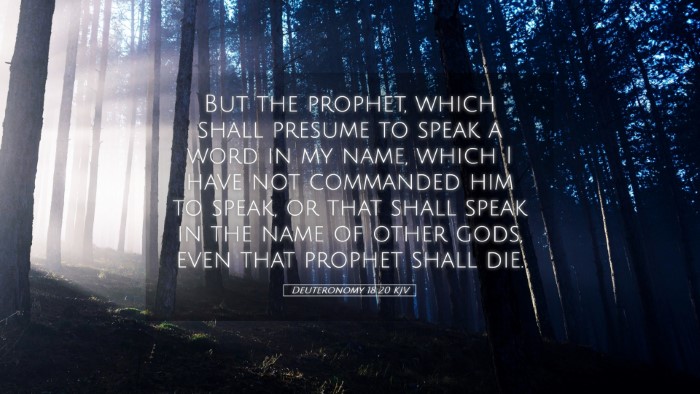Commentary on Deuteronomy 18:20
Text of Deuteronomy 18:20 (KJV): "But the prophet, which shall presume to speak a word in my name, which I have not commanded him to speak, or that shall speak in the name of other gods, even that prophet shall die."
Introduction
This verse serves as a crucial guideline in discerning true prophecy from falsehood within the context of Israel’s covenant with God. The significance of prophetic authority is underscored, warning against presumption in declaring messages that originate outside of divine command.
Historical Context
The book of Deuteronomy is positioned as Moses’ final address to the Israelites before they enter the Promised Land. In this context, leadership—especially prophetic leadership—holds prominent importance. The Israelites are cautioned about the authenticity of prophetic messages, emphasizing the high stakes associated with speaking on behalf of God.
The Role of the Prophet
- Authority of Prophecy: Matthew Henry emphasizes that a prophet acts as a mouthpiece for God. Speaking presumptuously undermines the seriousness of divine calling and authority.
- Expectation of Obedience: Albert Barnes notes that prophets must only speak what God commands, distinguishing their messages from personal or cultural instincts. This aligns with the principle that divine revelation is the foundation for prophetic integrity.
- Severity of False Prophecy: Adam Clarke highlights the grave consequences of false prophecy, indicating that such presumption incurs severe judgment. The vitality of maintaining fidelity to God’s word is evident in the prescribed doom for false prophets.
The Warning Against Presumption
This verse points out two critical elements in prophetic integrity: presumption and misrepresentation of divine will. The presumption to speak in God's name without His command categorically dissociates the speaker from divine endorsement.
Consequences of False Prophecy
The prescribed consequence for a false prophet is death. This stark declaration underscores God’s commitment to truth and the necessity of having a faithful witness to His Word among His people.
Interpretational Insights
- Exclusivity of True Prophecy: In accordance with the initial biblical audience, the Israelites were to recognize that authentic voices were limited to those sanctioned by God. This led to a community relation reliant on divine wisdom.
- God's Justice: The penalty of death serves as an indication of God’s justice. Both Henry and Clarke point out that such severity reflects God's holiness and foundational desire for His people to walk in righteousness.
- Application to Contemporary Faith: The caution to discern true prophetic voices holds relevance today. Spiritual leaders and congregants alike must be vigilant against teachings that deviate from scriptural truth.
Broader Theological Implications
This verse embodies a theological understanding that reveres God’s Word as supreme. The foundation of prophecy rests on divine revelation and authority. As believers, understanding the importance of genuine prophetic calling is pivotal, especially in a culture inundated with various self-proclaimed spiritual leaders.
Affirmation of God's Sovereignty
The rejection of false prophecy emphatically affirms God’s sovereignty over His revelation. As Barnes elaborates, every spoken word must align perfectly with God’s character and will; failure to do so not only discredits the prophet but also misrepresents God Himself.
Conclusion
In summation, Deuteronomy 18:20 serves as a timeless reminder of the importance of prophetic authenticity. For pastors, scholars, and students, it reinforces the weight of speaking truthfully in God’s name, reiterating the need for diligence in discerning divine communication. As the church continues to navigate contemporary challenges, the principles underlying this verse remind us of our obligation to remain rooted in Scripture, holding fast to the truth that God has revealed.


